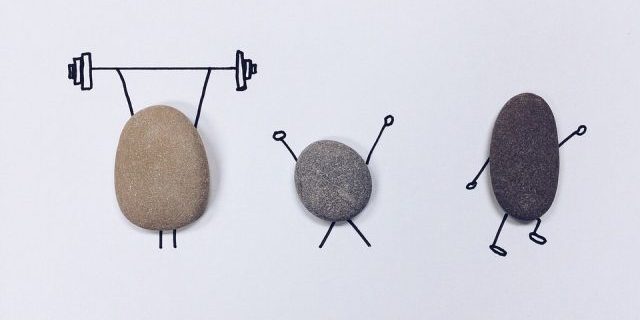
I know I should be exercising regularly, but just thinking about going to the gym makes me stressed out. I always plan on working out, and then feel like such a failure when I don’t. How can I actually stick with an exercise routine?
This is such a great question, and you are FAR from the only person who wants an answer. Getting regular exercise is a challenge for a lot of people, for a whole host of reasons. You are definitely not alone.
First, let’s talk about your personal relationship to exercise.
Right now, it sounds like just thinking about fitness stresses you out and makes you feel bad about yourself. This is really common. In our culture, working out is closely linked with being attractive, successful, hard-working, and an all-around “good person.” Unfortunately, this also sends the message that if you DON’T work out, you are the opposite: ugly, lazy, and “a failure.”
As if this wasn’t already enough, exercise is sold to people (especially girls) as all about weight loss and shaping the perfect body. This means that many people associate working out with negative thoughts about how their body looks. Many people also get discouraged when they don’t immediately lose weight. If that sounds like you, we talk more about body image, exercise, and weight loss here.
But (and we can’t emphasize this enough) how much you exercise has absolutely NOTHING to do with how good of a person you are. You are amazing and beautiful just the way you are, and exercising (or not!) does not change that.
The next time you skip out on your workout routine, forgive yourself. Your brain associates exercise with shame and self-doubt—of course you feel stressed when you think about working out! When you start feeling stressed, remind yourself that your worth is not based on your exercise habits.
If you keep feeling stressed and upset about exercise, consider talking to a therapist. They can provide you with tools and exercises to retrain your brain and help with your negative thoughts about yourself.
The way that culture has twisted people’s relationship to exercise is really unfortunate, because (as you probably already know) moving your body does a TON of good stuff for it. It can help you sleep better, give you energy, work through stress, and strengthen your bones and muscles. It also decreases the risk of heart disease, diabetes, high cholesterol, and so much more! This is why it’s so great that you want to work through what’s keeping you from exercising.
Now that we’ve talked about your relationship to exercise, let’s cover some other steps you can take to motivate yourself.
Remember: Before you start a new exercise program, make sure to talk to your health care provider. They can make sure that your workout plan is healthy, safe and age-appropriate.
Experiment with different physical activities to find something that you enjoy. Going to the gym may just not be your thing. If you like dancing, find some dance exercise videos online or sign up for a hip-hop dance class. You could also try yoga, kickboxing, martial arts, hiking, tennis, basketball, fencing, swimming, or another activity that gets your body moving! Just walking is one of the healthiest exercises you can do, and it doesn’t cost anything. Your neighborhood YMCA has all kinds of fun fitness classes, and many of them give financial assistance if you can’t afford the membership fee. If you or your family can afford it, consider using a personal trainer who has experience working with young people.
Don’t feel like you HAVE to do the recommended 30- 60 minutes of exercise. Just 10 minutes can give your health a huge boost. If you don’t have the energy or time for a full workout, try doing 5-15 minutes of physical activity. You can add on more minutes over time, or you can do 2 or 3 short sessions during the day.
Pay attention to how your daily activities affect your motivation. For example, maybe you have a hard time leaving your house after you get home from school. To work around this, try going straight from school to the gym.
Consider enlisting a friend or family member to help. Having a buddy to exercise with (or just check in) can help you stick to a routine.
If you’re 10-22 years old and live near NYC, you can join Mount Sinai Adolescent Health Center’s completely free Teen Fit program, designed specifically for teens. We also provide free, non-judgmental primary care, mental health care, and more.
